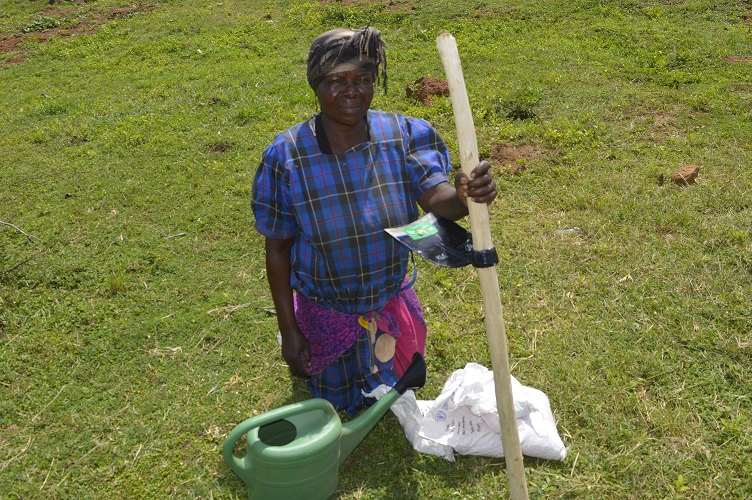
As she kneels down holding unto to a hand hoe given to her by Food and Agricultural Organisation of the United Nations she says “the season is going to start well because we are going to plant, planting for our children and ourselves” as her children happily pounce about.
Then adds “Mwebale kutulowoza Kku, mwebale ensigo zino ne Nkumbi. Okibumba abawe umukisa loosely meaning thanks so much for thinking about us, thanks for the seeds and hoes, may God reward FAO).
However, the same eyes turn to sadness the moment memories of the 2019 floods that washed away her garden and destroyed all her crops set in.
The floods left her homeless, and there were days she went without food in her home and cursed why she had even got married in Telepai village.
“When the floods cleared, there was no food, every place grew bushy, we walked passed our gardens unknowingly, we only counted losses and wasted efforts,” says Sapiri.
Sapiri’s life after the 2019 floods may be depressing, but she is not alone.
The 56-year-old is one of the over 10, 000 farmers in Pallisa, Bududa, Kumi, Bundibugyo and Ntoroko districts whose gardens were submerged by floods.
It is estimated that many farmers lost hectares of rice fields, maize fields, Beans, Cow peas and many hectares of cropland to floods in 2019.
When PML Daily visited Pallisa May 29, water line stains on the sides of many huts and dry gardens without crops in deeply rural Telepai and Opwatete villages, are some of the marks that are visible after the 2019 floods that hit Pallisa district, leaving hundreds of people homeless.
The major infrastructure including latrines, houses and medical facilities was destroyed and the residents in the affected Districts of Pallisa also lost about 80 per cent of their crops that had been planted that season.
Ray of hope
In response to the devastating 2019 floods, FAO partnered with the Office of the Prime Minister [OPM] and other implementing partners upon getting reports from the districts about floods to provide a start-up kit for farmers.
According to the communications officer FAO Ms Agatha Ayebazibwe, the organisation got assistance for the farmers from Central Emergence Response Fund-the United Nations system that supports emergencies to assist families that were affected by the 2019 floods.
Ms Ayabebaziwe said FAO assistance packages to flood-affected farming families comprise a provision of crop seeds like Maize and Cow peas and nutritional food items like Tomatoes, Egg plants, Okra and Water melons.
“The FAO donation means a lot to all farmers in the area, this donation was informed by the reports from the districts about the destruction caused by the 2019 floods, it is just a start-up kit to help farmers get back to their gardens,” said Ms Ayebazibwe.
She revealed that FAO has given out maize and cow peas seeds to 4435 households in Kumi, 263 households in Bududa, 1048 households in Pallisa, 4000 households in Bundibugyo and 2724 households in Ntoroko districts.
“And we have also given out hand hoes to farmers in the same districts, besides a wreck, watering can and Tomato, eggplant and Okra seeds for planting this season,” Ms Ayebazibwe explained.
The Kibale sub-county Ms Gertrude Nalumansi while presiding over the giving out of the seeds to farmers described the assistance from FAO as timely.

“Emergency support is timely and I know that it will help enhance the agricultural production capacities of farmers affected by 2019 floods in this area this season,” said Ms Nalumansi.
Mr John Okoboi, the District Agriculture Officer said the district was also in advance planning to deal with serious floods to significantly reduce the social and economic impacts on society.
“And this emergency intervention will enable farmers to rebuild their farming systems and get back to their normal lives. The fact that they will be working on their own fields for a wage will motivate them to restore their livelihoods quickly,” said Mr Okoboi. Ends
About FAO
The Food and Agriculture Organization (FAO) is a specialized agency of the United Nations that leads international efforts to defeat hunger.
Its goal is to achieve food security for all and make sure that people have regular access to enough high-quality food to lead active, healthy lives.
With over 194 member states, FAO works in over 130 countries worldwide, FAO believes that everyone can play a part in ending hunger.
According to Byaruhanga, a Ford Motor vehicle reg. No. UBD 896E has been revealed to be the one that knocked the traffic officer. “How did this vehicle reach Bweyogerere Police?” He noted.
He added that “Why was police condemning me before getting the driver of the Ford UBD 896E? why are its pictures not being released to the media but its only mine which are being released?”
He said judiciary as an Institution is being maligned and it should, therefore, demand for among others the CCTV footage of the collision.
In addition, an explanation why the Ford driver never stopped to offer help or to ascertain the life of the knocked traffic officer if his version of the incident is the correct one to be believed.
He added that he demands the release of his driver and the bodyguard who up to date are still being held.
Byaruhanga requested that a forensic examination be carried out of both vehicles and the motorcycle which the traffic officer was riding and then the surface of the road at the scene.
“It is my firm belief that the above will reflect the truth. The just God we serve shall judge,” said Byaruhanga.




